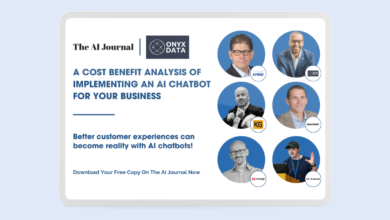
Here’s a not-so-fictional scenario: It’s been a long day at the office – or more likely these days, on video chat. You have a stack of important but dull work that needs to get done before you can clock off. And yeah, maybe your fingers start twitching towards your laptop and they type ChatGPT into the search bar of their own volition. And maybe you let a robot write the intro to your all-staff email about the new process of how to send an invoice to the finance team.
It seems pretty clear to see that in some areas, like humor, ChatGPT falls short. And yet almost every tech founder I know has felt the pull of AI and its supposedly magical properties.
I’ll raise my hand: that was me. Especially among tech founders like me, who know how powerful tech can be to make your life easier, there’s a real temptation to let AI text gen do everything for you. That can range from drafting morale-boosting messages to send on Slack to sending that irksome message to a peer that you’re not going to be able to make it for coffee when you said you would.
Luckily, I snapped out of it before I gave into the temptation of AI and annoyed or alienated everyone around me. And I’m happy to serve as a warning to other similarly-minded founders who are feeling the tug.
AI is no substitute for real leadership
If my writers told me that they started outsourcing their jobs to ChatGPT, I admit, I’d be more than a little miffed. I would probably lecture them like a disappointed father: “Shortcuts are no substitute for good, honest work.” Which is true, and it’s doubly true if you’re in any kind of C-suite leadership position. Not only do you lead by example, but you also make important decisions that affect the livelihoods and jobs of many people besides yourself.
What makes you a good CEO, CFO, or any other kind of director or leader at your company? I’ll bet it has everything to do with your human attributes. You have good intuition. You know when to trust your gut, and when to look for external validation. You’re good with people, and you can build relationships. You can make hard decisions, and you’re not afraid to take responsibility for mistakes as well as successes.
In other words, you’re more than just efficient processes and optimized workflows. You’re a leader. As tempting as it might be to let a machine write your emails, craft your messaging, or manage your team, it’s important to remember that AI can never fill the boots of a human leader.
How to use AI for company comms
Let me reassure you that I believe in an AI-assisted future. I’m the CEO of a PR company that uses AI to draft media pitches, so I know first-hand that AI can reliably generate useful text. I also know that, in certain scenarios, it’s not the right fit. Here are some practical suggestions for where AI text gen is – and absolutely isn’t – a good idea for internal company use.
The Good: Letting someone go
Wait, I hear you say. Isn’t firing someone a situation that requires a genuinely human touch? Wouldn’t relegating this responsibility to a heartless machine be a little, well, cowardly? The truth is, letting someone go is one of the hardest things anyone can do in business. And sometimes hard things can be made a little easier when you have a template to work from, something you can genuinely personalize.
So, I used AI to help me draft a letter letting go of one of our writers. It was tough to make the call, and once I had, I was not looking forward to drafting the letter to let her know. AI helped me break through my writer’s block.
Dear Elena,
I hope this message finds you well. As we spoke about on the phone yesterday, I wanted to let you know that I have decided to make a change regarding the writer position.
While I truly appreciate your hard work and dedication, I have found that someone who already works within the company is a better fit for the position due to their existing knowledge of our clients and more flexible availability.
I want to express my gratitude for all the effort and contributions you have made during your time as a writer for us. Your work has been valuable, and I appreciate the effort you have put into every task.
If you ever need a reference or recommendation, please don’t hesitate to reach out to me. I would be happy to help. I wish you the best of luck in your future endeavors.
Thank you for everything.
Sincerely,
Steve
The Good: Job descriptions
We recently had to hire a developer. I have less experience writing technical job descriptions, and AI text gen helped me get the language right in explaining some of the requirements, though I did have to run it by our developers.
We are looking for an experienced person to join our team as an influencer contact information engineer and help us build a comprehensive database of contact information for influencers across various industries. You will be responsible for developing and maintaining a system that collects and updates information on over one million contact records by employing scraping techniques and accessing paid databases. You will work closely with existing engineers to connect this information to existing contact records and content databases.
While a version of this AI-generated job description did eventually go live, it needed a lot of work. The original was full of fluffy, irrelevant verbiage like “working in an entrepreneurial culture.” What does that mean? I don’t know, and I certainly wouldn’t expect any new team members to understand that, either.
For hiring new members, you want to be 100 percent sure that you nail the tone, the responsibilities, and the culture your new employee can expect to walk into.
The Bad: Motivational messages
One area where AI simply doesn’t make the grade is crafting motivation messages. Here’s a terrible AI-written motivational message that I ended up sending to the team as a joke:
Dear SEO team,
I wanted to take a moment to express my appreciation for all the hard work you’ve been putting into optimizing our website for search engines. Your dedication and expertise are invaluable to our company’s success.
I have complete faith that with your skills and knowledge, we will soon see a 10x increase in our website traffic. I know that this may seem like a daunting task, but I believe that you are more than capable of achieving this goal.
Remember, success is not always about being the best, but about never giving up. Keep pushing yourselves to be better every day and never lose sight of the end goal. I have no doubt that together, we can accomplish anything we set our minds to.
Thank you for all that you do, and let’s make it happen!
Best regards,
[Your Name]This is not sincere. This is not meaningful. And it’s certainly not in any way motivational. What it is is bland and generic. My team rightfully responded with an AI-generated message of their own:
Thank you for your kind words and encouragement! Rest assured, we are not ones to shy away from a challenge, even if it means climbing the Mount Everest of website traffic!
We will continue to work hard and diligently, optimizing our website and staying up-to-date with the latest search engine algorithms. And who knows, maybe we’ll even break the internet with our traffic surge!
Spot the trend
If you look closely, you’ll probably see that AI text generation is good for a few use cases. It’s great at creating initial drafts that can then be revised. It certainly nails being funny by accident. And it can help with reducing your mental load by giving you something to edit, instead of needing to write fresh.
In short, AI is good at doing an initial, poor run of something. Just as I wouldn’t let my toddler run rampant with no supervision, I wouldn’t ever send out an AI-written message or piece without careful vetting and editing. Take it from me, a reformed AI enthusiast. While I still outsource some internal text tasks to AI text-gen tools, I no longer treat it as a panacea. Like anything else, AI is a tool that shines when used as directed.





